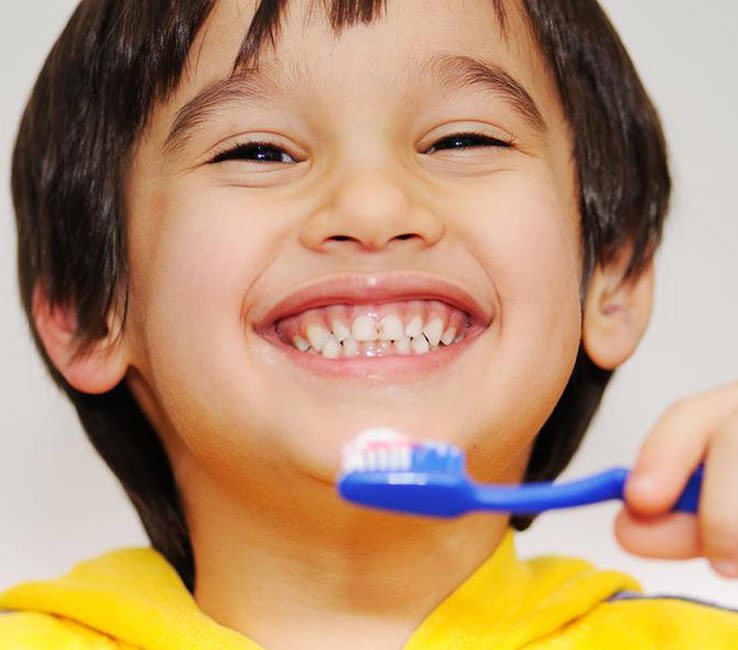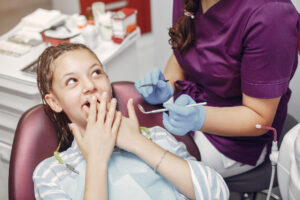1. Start Early: Establishing Dental Care Habits
Dental care should begin even before your child’s first tooth emerges. Clean your baby’s gums gently with a soft, damp cloth after feedings. Once their first tooth appears, typically around six months of age, switch to a small, soft-bristled toothbrush designed for infants. Use a smear of fluoride toothpaste, about the size of a grain of rice, and gradually increase to a pea-sized amount as they grow.
2. Brushing and Flossing: Teaching Proper Techniques
Teach your child the proper techniques for brushing and flossing early on. Encourage them to brush their teeth at least twice a day, in the morning and before bed, using gentle circular motions. Ensure they brush all surfaces of their teeth, including the fronts, backs, and chewing surfaces. Supervise brushing until they are around eight years old to ensure thorough cleaning.
Flossing is equally important as it helps remove food particles and plaque from between teeth and under the gumline. Start flossing your child’s teeth as soon as they have two teeth that touch. Use gentle, back-and-forth motions to slide the floss between teeth and curve it around each tooth in a C shape.
3. Encouraging a Healthy Diet: Impact on Dental Health
A balanced diet plays a significant role in dental health. Limit sugary snacks and beverages, as frequent exposure to sugars can lead to tooth decay. Encourage tooth-friendly foods such as fruits, vegetables, dairy products, and lean proteins. These foods provide essential nutrients that promote strong teeth and gums.
Ensure your child drinks plenty of water throughout the day, especially between meals. Water helps rinse away food particles and maintains saliva production, which is crucial for neutralizing acids and protecting tooth enamel.
4. Regular Dental Check-Ups: Preventive Care
Regular dental visits are essential for monitoring your child’s oral health and catching any issues early. Schedule their first dental appointment around their first birthday or within six months of their first tooth appearing. This early visit allows the dentist to check for proper dental development, discuss oral hygiene practices, and address any concerns you may have.
During routine check-ups, your child’s dentist will perform a thorough examination of their teeth, gums, and bite. Professional cleanings help remove plaque and tartar buildup that brushing and flossing alone cannot eliminate. These visits also provide an opportunity to discuss fluoride treatments, dental sealants, and other preventive measures to protect your child’s teeth from decay.
5. Managing Dental Anxiety: Creating Positive Experiences
Dental visits can sometimes be intimidating for children. To ease their anxiety, start preparing them for dental appointments early on. Explain what to expect during the visit in a positive and reassuring manner. Use child-friendly terms to describe dental instruments and procedures, emphasizing that the dentist is there to help keep their teeth healthy and strong.
Consider scheduling a “meet and greet” appointment before their first official visit. This allows your child to become familiar with the dental office environment, meet the dentist and dental staff, and ask any questions they may have. Bringing along their favorite toy or book can provide comfort and distraction during appointments at Kavita’s Dental Clinic.
6. Addressing Dental Emergencies: Knowing What to Do
Despite preventive measures, dental emergencies can still occur. Be prepared to handle common dental injuries such as knocked-out teeth, chipped or cracked teeth, and toothaches. Immediate action can make a significant difference in preserving your child’s dental health.
- Knocked-Out Tooth: Rinse the tooth gently with water, taking care not to touch the root. Place it back in its socket if possible, or store it in milk or saliva until you can reach the dentist.
- Chipped or Cracked Tooth: Rinse the mouth with warm water and apply a cold compress to reduce swelling. Save any broken pieces and contact your dentist immediately.
- Toothache: Clean around the affected tooth with warm water and gently floss to remove any trapped food particles. Avoid placing aspirin or painkillers directly on the gums, as this can burn the gum tissue.
7. Preventing Cavities: Tips and Tricks
Preventing cavities is easier than treating them. Ensure your child brushes with fluoride toothpaste, flosses daily, and avoids sugary snacks. Regular dental check-ups are crucial for early detection and treatment of potential issues. Additionally, consider dental sealants, which are thin coatings applied to the chewing surfaces of the back teeth, providing an extra layer of protection against decay.
Importance of Fluoride: Strengthening Tooth Enamel
Fluoride is a mineral that helps strengthen tooth enamel and prevent cavities. Ensure your child uses fluoride toothpaste and consider fluoride treatments provided by your dentist. Drinking fluoridated water also contributes to maintaining strong teeth.
Mouthguards for Active Kids: Protecting Teeth During Sports
If your child participates in sports, a mouthguard is essential to protect their teeth from injury. Custom-fitted mouthguards provide the best protection and comfort. Consult your dentist about getting a mouthguard for your active child.
The Importance of Oral Hygiene



Write Reviews
Leave a Comment
No Comments & Reviews